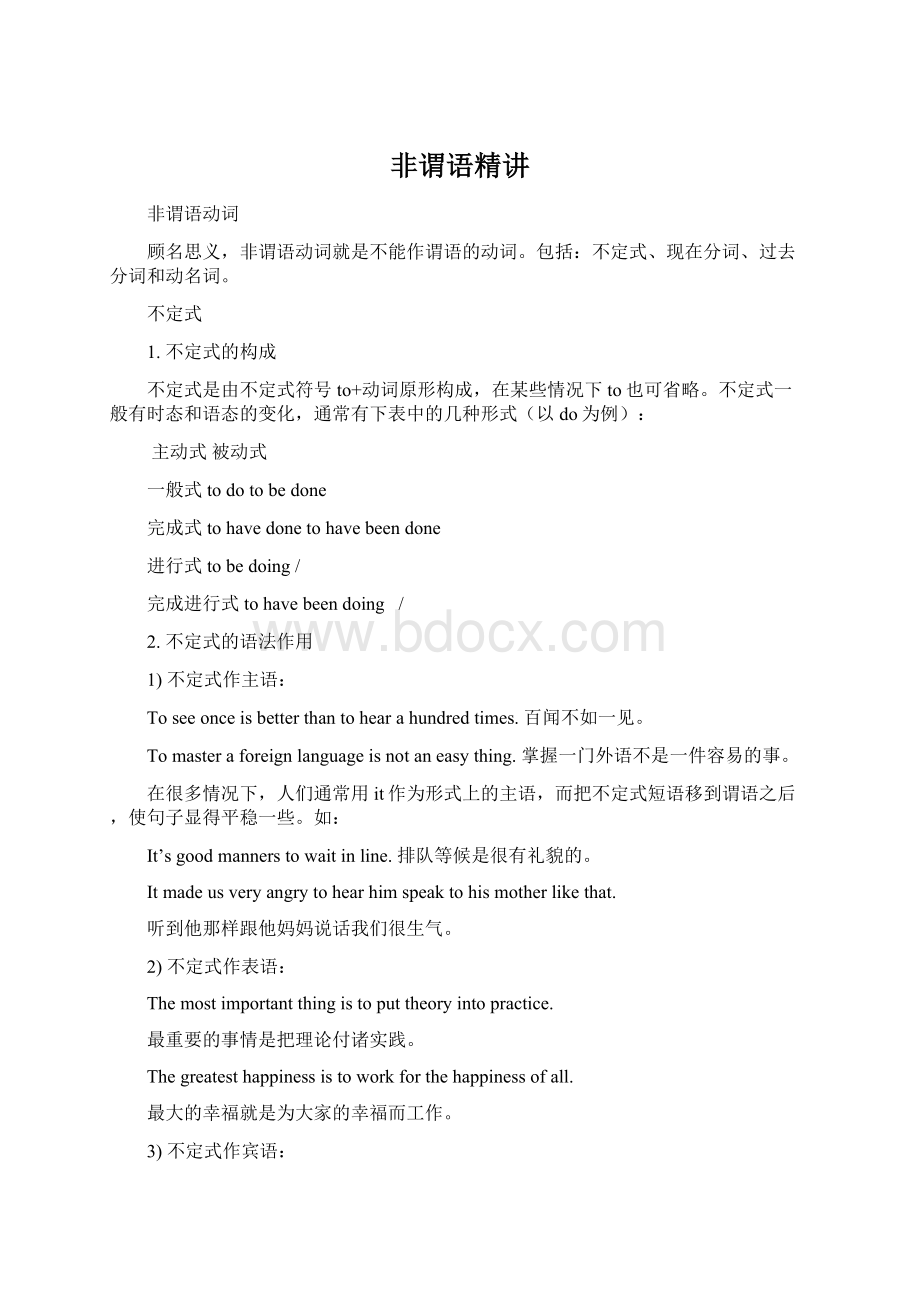非谓语精讲.docx
《非谓语精讲.docx》由会员分享,可在线阅读,更多相关《非谓语精讲.docx(21页珍藏版)》请在冰豆网上搜索。

非谓语精讲
非谓语动词
顾名思义,非谓语动词就是不能作谓语的动词。
包括:
不定式、现在分词、过去分词和动名词。
不定式
1.不定式的构成
不定式是由不定式符号to+动词原形构成,在某些情况下to也可省略。
不定式一般有时态和语态的变化,通常有下表中的几种形式(以do为例):
主动式被动式
一般式todotobedone
完成式tohavedonetohavebeendone
进行式tobedoing/
完成进行式tohavebeendoing/
2.不定式的语法作用
1)不定式作主语:
Toseeonceisbetterthantohearahundredtimes.百闻不如一见。
Tomasteraforeignlanguageisnotaneasything.掌握一门外语不是一件容易的事。
在很多情况下,人们通常用it作为形式上的主语,而把不定式短语移到谓语之后,使句子显得平稳一些。
如:
It’sgoodmannerstowaitinline.排队等候是很有礼貌的。
Itmadeusveryangrytohearhimspeaktohismotherlikethat.
听到他那样跟他妈妈说话我们很生气。
2)不定式作表语:
Themostimportantthingistoputtheoryintopractice.
最重要的事情是把理论付诸实践。
Thegreatesthappinessistoworkforthehappinessofall.
最大的幸福就是为大家的幸福而工作。
3)不定式作宾语:
Hewantedtoknowthetruth.他想知道真相。
Iprefertobestarvedtodeathratherthanbeg.我宁愿被饿死也不愿乞讨。
HepretendedtohavereadthebookwhenIaskedhimaboutit.
我问到他的时候,他假装读过这本书。
另外,不定式在某些复合宾语中作宾语时,人们常常用it代表不定式,而将真实宾语放在补足语之后。
如:
Doyouthinkitbettertotranslateitinthisway?
你认为这样翻译是不是更好?
Ifeelitagreathonortobeinvitedtospeakatthemeetingbeforesomanystudents.
我觉得被邀请在会上面对这么多学生发言是一件很光荣的事情。
4)不定式作补语:
①不定式可以和名词或代词一起构成复合结构作动词的宾语,这时不定式被称为宾语补足语。
IwouldlikeyoutohelpmewithmyEnglishexercises.我想请你帮我做英语练习。
Ineverexpectedtheshoestobewornoutsosoon.
我从来没想到鞋子这么快就穿破了。
注意:
动词help后面接不定式作宾语或宾语补足语可以带to也可以不带to。
如:
Whocanhelpme(to)carrythisheavybox?
谁能帮我拎这个重箱子?
②在make,let,have等使役动词和hear,see,watch,notice,feel,observe等感官动词后的复合宾语中,动词不定式不带to,即动作的全过程结束了
Ioftenhearhersinginthenextroom.我经常听到她在隔壁唱歌。
Theymakethebabygotobedat7:
00p.m.everyday.
他们每天让孩子晚上7:
00上床睡觉。
注意:
get,leave等词也有“让”“叫”的意思,和使役动词意思相近,但它们后面的不定式作宾语补足语必须要有to。
如:
I’llgethimtotryitagain.我将让他再试一次。
Howcouldyouleavehimtohavesupperwithastranger?
你怎么让他跟一个陌生人一起吃晚饭?
注意:
当使役动词和感官动词变为被动语态时,不定式就成了主语补语,作主语补语的不定式必须加to。
如:
Thoughhehadoftenmadehislittlesistercry,todayhewasmadetocrybyhislittlesister.
尽管他经常弄哭他的小妹妹,但今天他却被他的小妹妹弄哭了。
Heisoftenheardtosingthesong.经常有人听到他唱这首歌。
⑤不定式作定语时,有时与被修饰的名词之间有意义上的动宾关系,如果该不定式动词是不及物动词,它后面需加上适当的介词。
如:
Thereisnothingtoworryabout.没什么可担心的。
Therearemanyinterestingbookstochoosefrom,butIdon’tknowwhichtoborrow.
有很多有趣的书可以挑选,但我不知道该借哪一本。
6)不定式作状语:
不定式作状语可以表示行为的目的、结果、原因、条件等。
①不定式作目的状语,有时也可以用inorder(not)to,soas(not)to结构。
如:
Inordertoprotecttheyoungplantsfromthesun,Motherputthemintheshade.
为了保护幼苗不被太阳晒坏,妈妈把它们放到了阴凉处。
Hegotupveryearlythismorningsoasnottobelateforschoolagain.
今天早上他起身很早以免上学再迟到。
注意:
soas(not)todo不可以置于句首。
②不定式作结果状语,常见的结构有too…to,enough…to,so…asto,such…asto,onlyto…等。
如:
Thequestionistoodifficultformetoanswer.对我来说,这个问题很难回答。
Hesaidhewascleverenoughtodealwithitbyhimself.
他说他足够聪明可以独自应付这件事。
Willyoubesokindastoturndowntheradio?
请你帮我把收音机调低一点好吗?
Hewokeuponlytofindhimselfinhospital.他醒来发现自己在医院里。
注意:
too…to通常表示太……而不……,但在下列句子中没有否定的意思。
Sheisonlytoogladtostayathome.她太想留在家里了。
Heistooanxioustoknowtheexaminationresults.他很急切地想知道考试结果。
另外还有ready(现成的,乐意的),eager(迫切的),inclined(偏于…的),apt(易于)。
③不定式作原因状语,通常用来修饰表示情感、心理状态、性格等的形容词。
常见的形容词有:
happy,glad,lucky,fortunate,surprised,angry,anxious,ready,quick,slow,cruel,clever,frightened,shocked,sorry,eager,proud,disappointed,foolish,impatient,unwise,naughty等。
如:
Theyaresurprisedtolearnofhisdeath.得知他死亡的消息,他们很惊讶。
WeareproudtobeyoungpeopleofnewChina.成为新中国的青年,我们感到很骄傲。
另外,hard,difficult,easy,fit,comfortable等词也可以接动词不定式。
这时候,作句子主语的除了是表示人的词外,还可以是表示物的词。
如:
Thewaterisnotfittodrink.这水不适合饮用。
Theroomisverycomfortabletolivein.这个房间住起来很舒服。
注意:
后两句中的不定式与句子的主语或宾语之间是动宾关系,此时如果不定式动词是不及物动词,则需要带上适当的介词。
2.forsomebodytodo和ofsomebodytodo的用法区别:
句型“Itis+形容词+forsomebody+不定式”中的形容词通常强调不定式的行为属性,如:
important,possible,impossible,necessary,difficult,hard,reasonable等。
It’sdifficultforustofinishtheworkwithintwohours.
我们要在两小时之内完成工作是很难的。
It’sreasonableforthemtorunawaysoquickly.他们这么快就逃跑了是很有道理的。
“Itis+形容词+ofsomebody+不定式”中的形容词表示人物性格和特征。
如:
kind,silly,good,unwise,clever,wrong,right,foolish,stupid,careless,rude,impolite,bold,thoughtful,honest,bad,sensible,naughty等。
It’skindofyoutothinksomuchofus.难为你这么为我们着想。
It’ssillyoftheboytokeeppouringwaterintothebasket
这个男孩真傻,一直往篮子里倒水。
选择填空:
1.I’veheardhim______aboutyouoften.
A.speakB.speaksC.spokeD.speaking
2.Iwenttoseehim,_______himout.
A.findingB.findC.onlytofindD.tofinding
3.Hedidn’tknow_______orstay.
A.toleaveB.ifthatheshouldleaveC.iftoleaveD.whethertoleave
4.---WilltheSmithsgoabroadthissummer?
---No,theyfinallydecided_______.
A.toB.notgoingC.nottoD.nottobegoing
5.---Iusuallygotherebytrain.---Whynot_______byboatforachange.
A.totrygoingB.tryingtogoC.totryandgoD.trygoing
6.Hepretended_______nothingaboutit.
A.knowB.toknowC.knowingD.knew
7.LittleJimshouldlove_______tothetheatrethisevening.
A.tobetakenB.totakeC.beingtakenD.taking
8.Theywouldnotallowhim_______acrosstheenemyline.
A.toriskgoingB.riskingtogoingC.forrisktogoD.riskgoing
9.Therearesomanykindsoftape-recordersonsalethatIcan’tmakeupmymind
______tobuy.
A.whatB.whichC.howD.where
10.CharlesBabbageisgenerallyconsidered_______thefirstcomputer.
A.toinventB.inventingC.tohaveinventedD.havinginvented
11.Themissingboyswerelastseen_______neartheriver.
A.playingB.tobeplayingC.playD.toplay
12.Thepatientwaswarned_____oilyfoodaftertheoperation.
A.toeatnotB.eatingnotC.nottoeatD.noteating
13.Iregret_______youthatweareunabletoofferyouemployment.
A.informingB.havinginformedC.toinformD.toinforming
14.Youhadbettergetadoctor_______yourbadtooth.
A.pulloutB.topulloutC.pulledoutD.pullingout
15.Thematterhadbetter_______asitis.
A.leaveB.beingleftC.leavingD.beleft
16.Hewassofoolish_______hiscarunlocked.
A.toleaveB.thatleaveC.astoleaveD.forhimtoleave
17.Almosteveryonefails_______thedrivingtestonthefirsttry.
A.passingB.tohavepassedC.topassD.inpassing
18.Thegirlwasmade_______shedidn’tloveatall
A.marryamanB.tomarryamanC.tomarrywithamanD.marriedwithaman
19.Themanwillusewhathehas_______acameraforhiswife.
A.togetB.gotC.buyDbought
20..Toanswercorrectlyismoreimportantthan_______.
A.aquickfinishB.tofinishquicklyC.finishingquicklyD.youfinishquick
21.Tomkeptquietabouttheaccident_______losehisjob.
A.soasnottoB.sonotastoC.soastonotD.notsoasto
22.Ifeltitanhonor_______tospeakhere.
A.toaskB.askingC.tobeaskedD.havingasked
23.---I’dliketobuyanexpensivecamera.
---Well,wehaveseveralmodels_______.
A.tochoosefromB.tochooseC.tobechosenD.forchoice
24._______totheleftandyou’llseethepostoffice.
A.ToturnB.TurningC.TurnedD.Turn
25.Willyoubeabletoattendthelecture____nextweek?
A.givingB.givenC.tobegivenD.beinggiven
Ⅱ.句子改错:
1.Idon’tknowiftohelphimornot.
2.Shecan’thelpcleaningthehousebecauseshe’sbusymakingacake.
3.Weallhopeyoutomakerapidprogress.
4.Theresultsoftheresearcharetopublishsoon.
5.Itistooheavyformetoliftit.
6.It’sawfullygoodforyoutocomeandmeetus.
7.Theseareverygoodbooksforyourchildrentoberead.
8.Hedidwhathecouldhelpmewithmyphysics.
9.Let’sfindaplacetoputthethings.
10.Itwouldbeeasiertoclimboverthemountainthangoingroundthevalley.
动词不定式
I.选择填空:
1---5:
ACDCD6---10:
BAABC11---15:
ACCBD16---20:
CCBAB
21---25ACADC
II.句子改错:
1.if→whether2.cleaning→toclean3.hope→wish4.publish→bepublished
5.liftit→lift6.for→of7.beread→read8.help→tohelp
9.things→thingsin10.going→togo
动名词
主动形式被动形式
一般式doingbeingdone
完成式havingdonehavingbeendone
Hisnotcomingmadeallofusangry.他没来使我们大家都很生气。
Henevertalkedabouthishavingbeeninterviewedbythereporter.
他从来没谈起过他被记者采访的事情。
注意:
在need,want,require,beworth等动词(短语)后,作宾语的-ing分词常用主动形式来表示被动含义。
如:
Yourshoesneedcleaning.=Yourshoesneedtobecleaned.
你的鞋需要清洗一下了。
Thisbookiswellworthreading.这本书很值得一看。
1)–ing分词(短语)作主语:
Layingeggsistheantqueen'sfull-timejob.产卵是蚁后的专职工作。
Sayingiseasierthandoing.说比做容易。
在下面两种结构中,-ing分词也作主语。
①为了保持句子平衡,通常用作形式主语,而把真实主语放在句末。
如:
Itisnousecryingoverspiltmilk.作无益的后悔是没有用的。
It'sawasteoftimearguingaboutit.辩论这事是浪费时间。
②在Thereisno结构中,通常用-ing分词。
如:
Thereisnojokingaboutsuchmatters.这种事开不得玩笑。
Thereisnoholdingbackthewheelofhistory.历史车轮不可阻挡。
2)动名词-ing(短语)作表语:
可以表示主语的内容是什么。
如:
Theirjobisbuildinghouses.他们的工作是盖房子。
Hishobbyiscollectingstamps.他的爱好是收集邮票。
Theproblemisquitepuzzling.这个问题很令人困惑。
Therealquestionisgettingtoknowtheneedsofthepeople.
真正的问题是了解人民的需要。
3)动名词-ing作宾语:
①–ing作动词宾语。
Isuggestdoingitinadifferentway.我建议用另一种方法做这件事。
WeenjoyattendingMissLi'sclass.我们喜欢听李老师的课。
②-ing作宾语也可用在复合宾语中作真正的宾语,而用it作形式宾语。
如:
Idon’tthinkitpossiblelivinginsuchacoldplace.
我认为住在这么寒冷的地方是不可能的。
Doyouconsideritanygoodtryingagain?
你觉得再试一次会有好处吗?
③-ing分词作介词宾语,经常用在一些短语的后面。
如:
I'magainstinvitinghimtodinner.我反对邀请他来吃饭。
Theydon’tfeellikewalkingthatmuch.他们不喜欢走那么多路。
HewenttoLondoninthehopeofbeingafamouspainter.
他去了伦敦,希望能成为一个著名的画家。
此类短语还有很多。
如:
lookforwardto(渴望,盼望)
beproudof(以……自豪)
beresponsiblefor(对……负责)
insiston(坚持)
thinkof(考虑,想到),
dreamof(梦想)
objectto(反对,抗议)
hearof(听说)
prevent…from(防止,阻止)
keep…from(防止,阻止)
stop…from